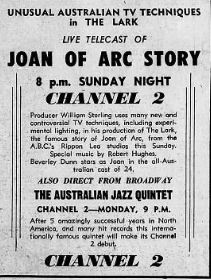The Lark (1959 film)
The Lark is a 1959 Australian TV play. Australian TV drama was relatively rare at the time.[4]
| The Lark | |
|---|---|
| Directed by | William Sterling |
| Written by | Alan Seymour |
| Based on | play The Lark by Jean Anouilh translated by Christopher Fry |
| Music by | Robert Hughes |
Production company | ABC |
| Distributed by | ATN-2 |
Release date | 16 November 1958 (Melbourne)[1][2] 18 January 1959 (Sydney)[3] |
Running time | 90 mins |
| Country | Australia |
| Language | English |

According to The Age it opened "a new era in TV drama production in Melbourne."[5]
Plot
At the trial of Joan of Arc, events are shown in flashback as to how she came to rebel against the English.
Cast
- Beverly Dunn as Joan of Arc
- Frank Gatliff as Cauchon
- Christopher Hill as Warwick
- Robert Peach as the Inquisitor
- Jeffrey Hodgson as the Dauphin
- John Morgan as the Promoter
- Moira Carleton as Joan's mother
- Mary Ward as Queen Yolande, the Dauphin's mother in law
- Laura Jane Casson as Agnes Sorel, as the Dauphin's mistress
- Carol Potter as the little Queen, wife of the Dauphin
- Keith Hudson as Ladvenu
- Ilka Brand as the Dauphin's page[6]
- Brin Newton-John as the Archbishop of Rheims
- John Royle as narrator
- Henry Cuthbertson as voice of Archangel
Production
The production was based on a play which debuted in 1955 in a production starring Leo McKern and Dorothy Tutin.
Director William Sterling said he worked on the production "for some months" and promised some "controversial surprises" in the play.[5]
It was shot in Melbourne using a cast of 24 and seven sets which occupied the entire 60 ft by 80 ft of Melbourne's Studio 32, one of the largest studios in Melbourne.[7] Historical research to ensure authencity of sets and costumes was carried out by designer Jon Peters.[5]
It starred Beverly Dunn as Joan. Dunn had played the role in Melbourne Little Theatre in 1956.[8][1] She did 55 hours of rehearsals.[9]
It was broadcast in a series of "live" dramas on Sunday night on ABV-2 Melbourne. In order, they were The Governess, The Last Call, The Rose without a Thorn, The Lark, Citizen of Westminster, and Enemy of the People (the last of "the season").[10]
Reception
The Melbourne broadcast was recorded and shown at a meeting of the Australian Television Society which Sterling attended. The members praised Beverly Dunn's acting but some thought the final burning scene could be more realistic. Sterling said some of the lighting effects were entirely new to Australian TV and said he was happy with the production "except for minor faults which few other viewers would notice anyway."[11]
References
- "From School Plays to Success on TV". The Age. 19 September 1958. p. 20.
- "TV Guide". The Age. 14 November 1958. p. 32.
- "TV Guide". Sydney Morning Herald. p. 12.
- Vagg, Stephen (18 February 2019). "60 Australian TV Plays of the 1950s & '60s". Filmink.
- "The Lark will Open a New Era for Melb TV Drama". The Age. 14 November 1958. p. 25.
- "Rehearsal of Trial". The Age. 14 November 1958. p. 27.
- "ABN to Screen "The Lark"". Sydney Morning Herald. 12 January 1959. p. 11.
- "The Lark to be Played Here". The Age. 11 February 1956. p. 4.
- "Stage and Television". Tue Age. 15 November 1958. p. 7.
- "Line Up of TV Dramas for Sunday Night". The Age. 26 September 1958. p. 24.
- "TV Society Members Producer Debate Drama". The Age. 28 November 1958. p. 27.